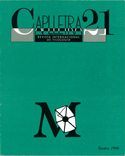Una alternativa tripartida: la varietat tradicional, la varietat estàndard catalana o la varietat estàndard espanyola
DOI:
https://doi.org/10.7203/caplletra.21.7342Paraules clau:
educació, català, varietat tradicional, varietat estàndard catalana, varietat estàndard espanyola Resum
Resum
The purpose of this paper is to show how the Catalan spoken in the south Valencian region is reacting to the effects of the linguistic normalization process that was initiated more than ten years ago. Basically, this process concentrated on two areas: on the one hand, education, where Catalan is present either as a compulsory subject, or as the language in which the whole teaching takes place; on the other hand, the spreading of several mass media which more or less use the language. We shall try to describe a few linguistic phenomena, phonetic as well as morphologic and lexical, through a survey carried out among various age groups and, in the case of small children, considering their school situation concerning Catalan and their family language. In this way, we shall grasp the predictable generational differences, the origin of which we shall try to find out, especially in order to relate the fact to the new sociolinguistic situation.
 Descàrregues
Descàrregues
Descàrregues
Publicades
Com citar
-
Resum307
-
PDF120
Número
Secció
Llicència
L’autor o autora que adrece un treball a la redacció de Caplletra perquè siga publicat ha de ser la persona titular legítima dels drets d'explotació. La legitimació per a la publicació del treball ha d’incloure també les imatges, les taules, els gràfics i altres materials que puguen complementar el text, amb independència de si n'és l'autor o autora.
Copyright. Quan publica el treball en la revista, l'autor o autora cedeix a Caplletra. Revista Internacional de Filologia els drets d'explotació (reproducció, distribució i comunicació pública), tant per a l'edició impresa en paper com per a la versió electrònica, que serà accessible mitjançant la xarxa Internet.
Tots els treballs publicats en Caplletra es troben sota una llicència Creative Commons del tipus Reconeixement-NoComercial-SenseObraDerivada 4.0.
RESPONSABILITAT
Caplletra. Revista Internacional de Filologia no s'identifica necessàriament amb els punts de vista mantinguts en els treballs que publica.
Caplletra. Revista Internacional de Filologia declina tota responsabilitat derivada de qualsevol vulneració eventual dels drets de propietat intel·lectual que poguera ser duta a terme pels autors o autores.






